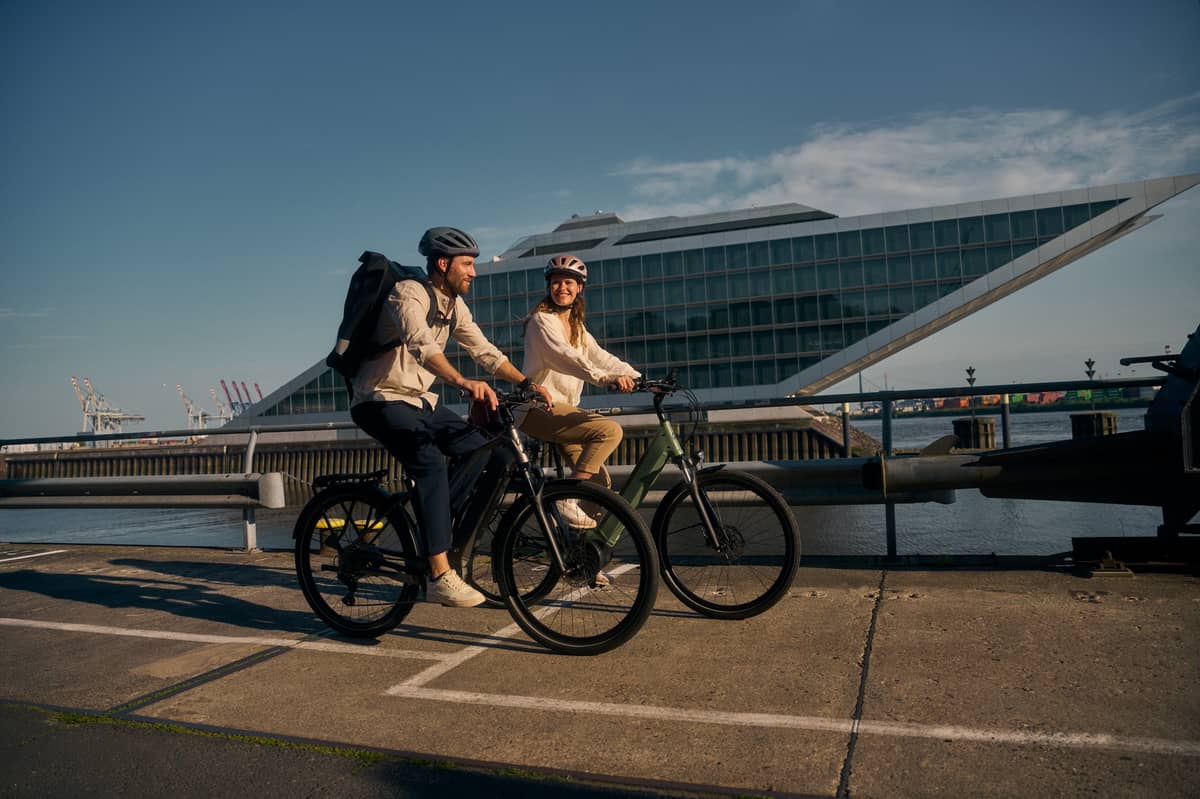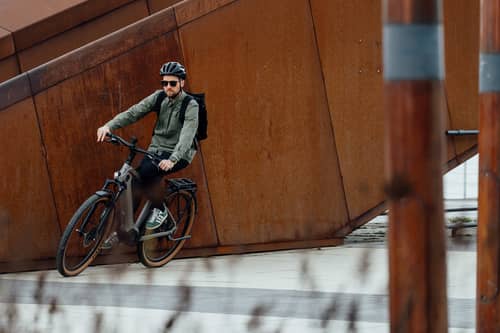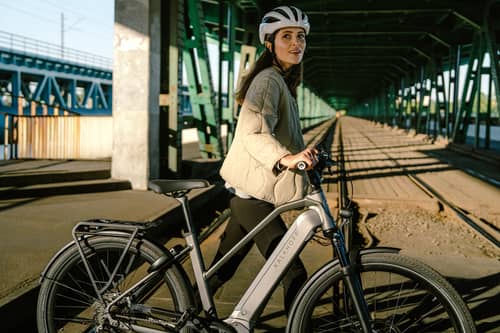
The year 2024 promises changes in the cycling world, driven by innovative trends that will fundamentally influence the way we cycle. From environmentally friendly cargo e-bikes to intelligent safety solutions and digital innovations - these trends are shaping the cycling culture on Germany's roads.
The focus on sustainable mobility and efficient transportation reflects the general trend on Germany's roads. This year, the cargo e-bike in particular is coming to the fore as the ideal solution for environmentally friendly travel and taking advantage of the many benefits of this form of mobility. Especially in large cities and regions where the cycling infrastructure is being improved, the cargo e-bike is gaining popularity in both the private and commercial sectors.
The development shows that transportation options with e-bikes are not just limited to cargo bikes. E-bike manufacturers are increasingly focusing on integrating practical and versatile transportation options into normal e-bike models. This enables users to carry more luggage both at work and in everyday life. Whether it's for the weekly shop, transporting pets or carrying children, the range of models available, whether single or double-track, offers riders a wide choice. The trend towards cargo e-bikes thus sends a strong signal for flexible and environmentally friendly transportation.
In 2024, safety on the bike will be redefined, especially for S-pedelec riders. The challenge of indicating turns while riding at high speeds of up to 45 kilometers per hour will be solved by innovative solutions. Intelligent indicators, specially designed for S-pedelecs, multi-track e-bikes and bicycle trailers, are a pioneering contribution to this and offer a practical solution to the safety problem in hectic city traffic.
The special feature is the intuitive operation: similar to modern cars, a short tap with the thumb is enough to activate the indicator. A longer press keeps the blinker active until it is pressed again. This innovative function allows riders to keep their hand on the handlebars and still turn clearly and distinctly.
The future of bicycle safety will be shaped by such technological developments that enable the smooth integration of safety functions into the everyday lives of cyclists. It should be noted that such indicators are not permitted on other types of bicycle.
A current trend in the bicycle industry is emerging: more and more companies are relocating their production facilities to Europe in order to meet the challenges of global supply chains. This shift is being driven by two key factors:
Resilience through local production: Experience during the coronavirus pandemic has shown how vulnerable supply chains from other parts of the world can be. Supply bottlenecks for bicycle parts from Asia due to production and delivery restrictions led to assembly difficulties and price increases. Companies are now increasingly relying on local production in Europe to strengthen the resilience of their supply chains and better manage unexpected crises.
Cost efficiency by reducing transportation costs: The rising transportation costs for importing bicycle parts to Europe, whether by ship, plane or truck, have a significant impact on production costs. Companies are recognizing the need to reduce dependence on global logistics chains in order to cut costs and minimize environmental impact. As a result of this trend, countries such as Portugal (now the largest frame producer in the EU), Poland, Romania, Turkey and Germany are increasingly becoming major production locations for bicycle parts.
This relocation of production to Europe shows that companies are increasingly relying on local resources in order to produce more flexibly, cost-efficiently and sustainably. The trend towards more bicycle production in Europe marks a renaissance of domestic manufacturing in the bicycle industry.
A significant trend is revolutionizing the world of e-bikes: they are now optimized not only for urban areas, but also for off-road use, and with an improved look. In the past, e-bikes were considered less suitable for off-road riding due to their bulky frames and heavy batteries. However, thanks to smaller batteries and narrower frames, off-road rides are now no longer a problem.


Aesthetic concerns about the battery and frame have so far deterred many potential e-bike buyers. The trend in 2024 is therefore towards more compact electric bikes that blend seamlessly into their surroundings. Advances in technology make it possible to integrate the battery into slim frames in such a way that it is barely noticeable. The future of off-road e-bikes therefore promises not only functionality, but also an appealing design that no longer detracts from the aesthetics of conventional bicycles.
An emerging trend is changing the cycling industry through the integration of sensors, trackers and other digital features. The smartphone is becoming an indispensable companion for cyclists, far beyond mere navigation. Especially in the context of e-bikes, digitalization is opening up new, innovative possibilities:
The ability to track the bike using sensors is revolutionizing theft protection. Cyclists can check the location of their bike at any time and thus travel with greater peace of mind.
The integration of immobilizers, which are controlled via an app, ensures that the bike stays exactly where it is supposed to be. This innovative function increases safety and control over the vehicle.
The bike app on the smartphone not only becomes a navigation tool, but also a control center for motor updates. Users can conveniently carry out necessary motor updates via app control to keep the performance and functionality of their e-bike up to date.
Overall, the bike app is becoming an indispensable daily companion for cyclists, offering far-reaching functions for safety, theft protection and technical updates. The 2024 trend shows that digitalization is steering the world of cycling towards increased connectivity and smart functions.
In the current cycling landscape, modern mobility through bike leasing is gaining ground as a contemporary solution for companies and their employees. The increasing popularity of cargo e-bikes is finding a sensible application in the possibility of using environmentally friendly cargo bikes for business purposes. The increasing production of bicycles in Europe is reflected in the bike leasing offers, which not only leads to a wider choice of models, but also strengthens local economies.
The off-road capability and appealing design of e-bikes make bike leasing an attractive option for those looking not only for a means of transportation, but also a stylish companion. The ongoing digitalization of cycling fits effortlessly into bike leasing programs, as employees can benefit from innovative features. Bicycle leasing is therefore not only a means of employee retention, but also a contemporary response to the needs of sustainable mobility in the workplace.
The world of cycling is evolving to meet our needs. Cargo e-bikes make transportation easier, intuitive safety solutions ensure carefree rides, local production strengthens the economy, and smart features on the bike make riding even more enjoyable. 2024 will be the year in which the bicycle becomes more than just a means of transportation - it will become an even more practical, safer, more local and smarter companion on our journeys. Let's look forward to an exciting future on two wheels!
The year 2024 will see significant changes in the cycling world, driven by innovative trends that will have a fundamental impact on the way we cycle. From environmentally friendly cargo e-bikes to intelligent safety solutions and digital innovations, these developments will significantly shape the cycling culture on Germany's roads.
At a time when the focus is on environmental awareness and sustainable mobility, the company bike is becoming increasingly important as an ecological alternative to the company car, especially in urban areas. It's a good thing that there is a wide range of company bike options available. It can be difficult to decide on the right model. We have taken a close look at various types of company bike and examined their individual requirements.

The world of corporate benefits has changed significantly in recent years. In addition to traditional benefits such as health insurance and company pensions, sustainable mobility concepts are becoming increasingly important. A recent Statista study commissioned by Lease a Bike has now shed light on the popularity of company bike leasing as a corporate benefit in medium-sized companies.

E-bike batteries are diverse and differ in their chemistry, capacity and shape. Lithium-ion and lithium-polymer batteries are currently the most popular, but new developments such as calcium-air batteries could shape the future. Discover the different types of batteries, their advantages and disadvantages and valuable tips for longer life and optimal use.
